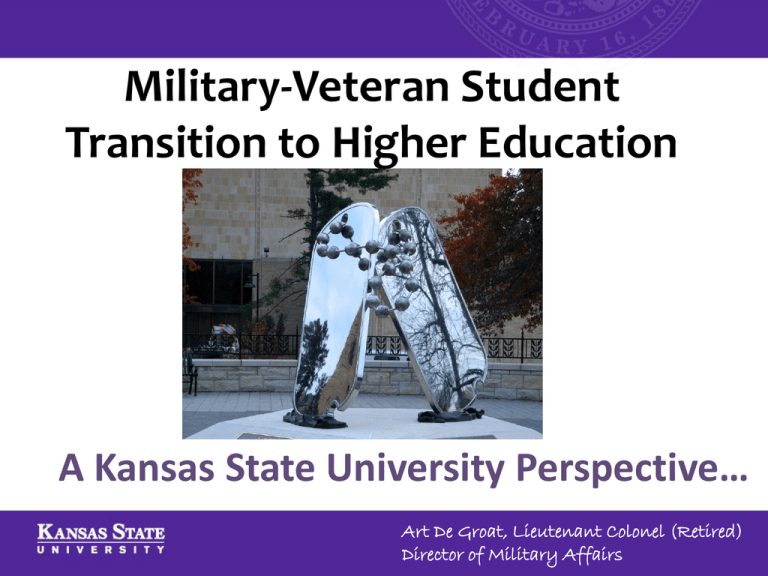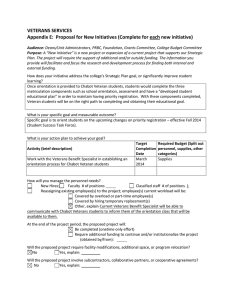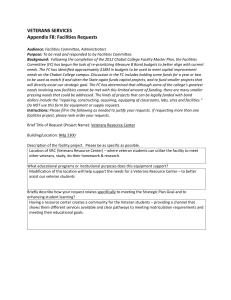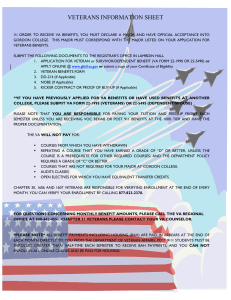Military-Veteran Student Transition to Higher Education A Kansas State University Perspective…
advertisement

Military-Veteran Student Transition to Higher Education A Kansas State University Perspective… Art De Groat, Lieutenant Colonel (Retired) Director of Military Affairs My Vantage Point on Military Veterans Education…. • ROTC perspective –former ROTC cadet & Professor of Military Science – Army ROTC program • Military student – completed two graduate degrees while on active duty – Masters of Military Arts & Science – Masters of Adult and Continuing Education • Higher Education Administration – serve as University Director of Military Affairs • Veteran student – Recipient of Post-9/11 GI Bill benefits • Scholarly perspective – Doctoral student in Educational Leadership My 6-Point Agenda • • • • • • More about who our new veteran students are.. What we are experiencing institutionally… Social expectations…and implications The veterans lived-experience… What educational research tells us… Some compelling insights from the K-State experience.. Point #1: More about who our new veteran students are… Who are our new military veteran students… • • • • • • Traditional undergraduate students? Under-represented minority students? First-generation college students? Students with disabilities and special needs? Non-traditional students? Graduate students? YES TO ALL… but are categorized by education researchers as a sub-population of non-traditional students Point #2: What we are experiencing institutionally… Our veteran-student educational expectations are being defined more by marketing messages than by advisement…. Fastest – Cheapest – Easiest to Complete Reform initiatives .. Senators propose new rules to prevent colleges from exploiting veterans for benefits Published March 10, 2012 | FoxNews.com Veteran-students What we are seeing on our campus… • • • • • • • • • • Increased enrollments.. High expectation for transfer credit.. Need to bond with a military cohort upon arrival.. Lack of desire to fully participate in traditional campus life.. Difficulty adjusting to freedom and autonomy.. Lack of willingness to learn new institutional functions..expect campus systems to work like highly-structured military system High need for financial advising and management.. Identity issues—some wish to blend in..other are advocates for veterans.. Need and respond well to mentorship by veteran administrators and faculty.. Reluctant to seek academic assistance… Overall Observation… They experience dissonance from what they believe and what they are experiencing… the key appears to be to mitigate while we educate them towards proper expectation and goal development Point #3: Social expectations…and implications…. Social Implications of Veteran Re-integration into Civil Society 2.2 M Vets Post-service employment Preparing the “next generation” Post-service education Future Volunteers to Serve “A matter of future National Defense” Business Executives For National Security A compelling observation… Social Reproduction of our Volunteer Military Class… Upper class Middle class Working class All Volunteer Force (1973) <1% 80+ % of new service members from families that have served The Post-9/11 GI Bill will not have the same social impact as Post WWII GI Bill.. The Veteran-student Readiness Work Force prior-education opportunity Traditionalist (1922 -1945) The Generation Generation Y (1981 -2001) values/world view draft/volunteer Point #4: The veterans lived-experience… Key Stages of the Veteran-student experience.. Transition to College Persistence @ College Success - Attainment of Degree • institutional selectivity • institutional commitment • goal refinement & commitment • pre-college characteristics • social engagement • self-efficacy • academic engagement Tinto (1993) & Bean (1985) Living Through Multiple, Simultaneous Transitions…. Role of Student Civilian Work Force Transition Personal Identity Our Veteran-student Parental Transition Marital Transition Role of Veteran The Critical Transition… The I WE I Transition Civilian Service Member Student Schlossberg (1989) Transition Theory Point #5: What educational research tells us… State of Contemporary Literature.. • The phenomenon of Post 9-11 veteran transition and student success is not adequately described….need more qualitative research to discover • Few researchers have personal military experience to fully understand context of what they are observing and finding.. • Relevant models and theories of student development and retention are being recommended.. • Bench-marking “best practices” appears to be used in place of applied research or evidence-based practice We have relevant literature…but not fully describing our challenge.. July 2009 November 2010 2011 Factors related to Veteran Student Transition.. • Level of contact with former colleagues.. • Average time in “neutral zone” –time between military and college • Type of transition being experienced.. • Awareness and self-definition of role changes.. • Presence of non-role dependent support of veteran student (usually family) • Presence of role-dependent support of veteran student (student peers, faculty, etc.) • Presence of a “helping professional” Diramio & Jarvis (2011) Point #6: Some compelling insights from the K-State experience… A Source of Tradition..and Strength… To be recognized as the most military-inclusive public research university in America A Philosophical Difference… Military - Friendly Military - Inclusive • military as an external sub-community • military as an organic member of campus community •served by separate systems of support • served by same systems of support • treated as niche student market • treated as integral part of student population • different faculty and academic systems • same faculty and academic systems • accommodate veterans expectations • same academic/student life expectations • limited services available for transition/ • additional assistance offered to enable meet student where they are at… transition/develop the student… Commitment to serve all military students “Military –Connected Students” ALSO An inclusive term for the true population-– – – – – Veteran Students – former service members Currently serving military students Military family member students – spouses/children Officer Pre-Commissioning students-ROTC cadets Military Degree Completion Student – recent officer candidate school graduates – Military Graduate Students - Advanced Civil Education Program – DOD Civilians and family members A comprehensive approach… Support Teaching & Faculty Engage in Military Research Promote Military Scholarship Becoming a Military-Inclusive Public Research University…. Connect and steward our Military Alumni Ensure Military Student Success Education Research Outreach Enhance Military Community Relations Share the Value of our Athletics Programs Provide Quality Military Programs Enrich Our Cultural Events A University-wide Military Affairs Enterprise Building a “military-inclusive” campus culture.. ..Our Partnership with 1st Infantry Division & Fort Riley Create new relationships Offer a diverse experience & perspective 57 programs exist today that aim to….. Build a stronger academic-military community Improve quality of life Enhance education & professional development Our current military- student population 2628 Military-Connected Students (Fall 2011)/ 10.9% of total student body 811 (31%) 836 (32%) 41 (2%) 288 (11%) 625 (25%) For more information…. Art De Groat, Lieutenant Colonel (Retired), USA Director of Military Affairs Kansas State University degroata@k-state.edu. (785) 532-0369


